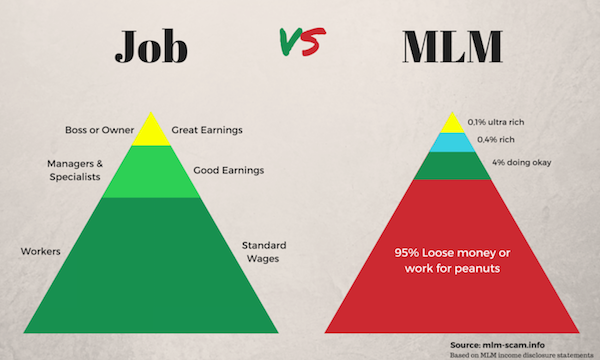| « A GOP Anti-abortion Policy Caused a 40% Increase in Abortions | Is Shakespeare Dead? by Mark Twain » |
Signs of a Pyramid Scheme
 I have an exciting opportunity for you! Wait, wait, come back! I just mean an opportunity to avoid being ripped off. I'm seeing more and more of my friends and family clogging up my social media feeds with pitches for diet pills, essential oils, vitamins, and other overpriced and medically dubious products. And they often show greater interest in recruiting more salespeople than in actually selling their products to the public.
I have an exciting opportunity for you! Wait, wait, come back! I just mean an opportunity to avoid being ripped off. I'm seeing more and more of my friends and family clogging up my social media feeds with pitches for diet pills, essential oils, vitamins, and other overpriced and medically dubious products. And they often show greater interest in recruiting more salespeople than in actually selling their products to the public.
Whether you call them multi-level marketing, network marketing, or direct selling, they're basically pyramid schemes. The simplest pyramid schemes run like this: I start a club and ask five friends to join. They pay me $100 each. Then they all recruit five of their friends to join and collect the $100 entry fee from the new members and so on. Each entry fee is split between the guy who collected it and the guy who recruited him, siphoning the money toward the top of the pyramid. Those of us that got in early make major bank, but everyone else just loses money because the recruiting can't go on forever. In fact, this scheme would burn through the entire population of the Earth in only 14 levels.
Pyramid schemes like that are illegal, but multi-level marketing schemes (MLMs) side-step the law by tacking on a product to this structure. What the product is doesn't matter all that much. It helps if the product is disposable, vague, and overpriced. It's essentially a money-laundering device. So, instead of charging an entry fee to join a pyramid club, MLMs charge a "start-up fee" to buy an initial stock of the product. That fee triggers commissions for the seller who recruited you and the seller who recruited them, etc., on up to the top of the pyramid.
MLMs offer bold promises of financial independence by highlighting people from the tiny fraction of members in the top levels of the pyramid who are making a profit. But, according to a report by the Consumer Awareness Institute, 99.6% of MLM sellers never make a profit. They lose money. Many continue sinking money into "start-up fees" and monthly autoship minimum orders until they have a garage full of unopened boxes and tens of thousands of dollars of debt. The high-pressure sales tactics required by MLMs also leave friendships in tatters.
How can you recognize the signs of an MLM? Here are a few red flags to watch for:
Unproven/overpriced product
 MLMs usually involve a product that has big promises attached to it, but little scientific research. Weight loss gimmicks like pills, vitamins, shakes, and "body wraps" are common. But cleaning products, kitchen knives, essential oils, candles, makeup, jewelry, and leggings have also been used to launder money through pyramid schemes. Examine the evidence behind the product. Is it backed up by scientific research? Or is it modern-day snake oil? Is the product actually as unique and affordable as the MLM claims? Or can you find similar products online for much cheaper? Hint: If multiple levels of upline sellers are taking a commission from every sale, then the product is probably overpriced.
MLMs usually involve a product that has big promises attached to it, but little scientific research. Weight loss gimmicks like pills, vitamins, shakes, and "body wraps" are common. But cleaning products, kitchen knives, essential oils, candles, makeup, jewelry, and leggings have also been used to launder money through pyramid schemes. Examine the evidence behind the product. Is it backed up by scientific research? Or is it modern-day snake oil? Is the product actually as unique and affordable as the MLM claims? Or can you find similar products online for much cheaper? Hint: If multiple levels of upline sellers are taking a commission from every sale, then the product is probably overpriced.
Income from recruitment
It's a big red flag if sellers make a significant portion of their income by recruiting other sellers. In a legitimate business, multiple sellers in the same area see each other as competitors and market saturation is carefully avoided. So, if you're working as a salesman and spending much time recruiting other salesmen, you're probably in a pyramid scheme. You might be ripping off your own friends and family.
Selling to sellers
Another hallmark of the shadiest MLMs is that most of the product is sold not to the general public, but to other sellers in the MLM. If you're making a profit because you recruited people who have garages full of unused product and none of you are selling much to the public, then you're in a pyramid scheme. If showing the slightest interest in a product prompts the seller to recruit you as a competing salesman, then take it as a clue that this isn't actually about selling products.
Financial statistics
 If someone is trying to recruit you for an MLM, ask questions like "How much profit does the average rep make in their first year?" and "How much of my own money do I have to spend to become profitable?" and "What percentage of sellers make no profit?" The companies often put out income disclosure statements. These tables invariably show that only the top levels of the pyramid bring home a profit. Even so, these disclosures are misleading. They use tricks like only including "active distributors" in their numbers (excluding much of the overwhelming majority of people who don't make any money) and showing gross income numbers rather than profit. $500 in income is not so impressive once you subtract the $1,000 in expenses and fees that you paid. The financial numbers MLMs disclose are terrible. But dig a little deeper and they get even worse.
If someone is trying to recruit you for an MLM, ask questions like "How much profit does the average rep make in their first year?" and "How much of my own money do I have to spend to become profitable?" and "What percentage of sellers make no profit?" The companies often put out income disclosure statements. These tables invariably show that only the top levels of the pyramid bring home a profit. Even so, these disclosures are misleading. They use tricks like only including "active distributors" in their numbers (excluding much of the overwhelming majority of people who don't make any money) and showing gross income numbers rather than profit. $500 in income is not so impressive once you subtract the $1,000 in expenses and fees that you paid. The financial numbers MLMs disclose are terrible. But dig a little deeper and they get even worse.
Too good to be true
 If something seems too good to be true, it probably is. Everyone would love to make easy money from home, lose weight without life changes, and be their own boss. That's not the way the world works. If someone is recruiting you with big promises, ask yourself if they stand to benefit from you believing a false promise.
If something seems too good to be true, it probably is. Everyone would love to make easy money from home, lose weight without life changes, and be their own boss. That's not the way the world works. If someone is recruiting you with big promises, ask yourself if they stand to benefit from you believing a false promise.
Cult-like vibe
Like cults, MLMs tend to be led by charismatic leaders, discourage dissent, drive a wedge between group members and their families, and attack outside critics. Clips from MLM conferences (see video below) include scenes reminiscent of religious revival services. Recruiters try to be your main source of information while discouraging independent research. They'll put words in your mouth by giving you copy-and-paste posts for your social media. They'll expect absolute loyalty to your upline seller and evade any questions you ask about the business model.
High-pressure tactics
If the recruiter pushes you to make snap decisions to join, upgrade your membership, or buy big batches of product, be wary. If the sellers say something is selling out at midnight, it's not. Don't let yourself be lied to. If they suggest you take out credit card debt to cover the start-up costs, run in the opposite direction as fast as you can.
If a company engages in one or more of these tactics, beware!
 Selling for an MLM is neither a job nor a small business. You're not an employee and have none of the wages, benefits, or protections that come with real jobs. But you're also not a small business owner since you don't make decisions about products and prices and you're not building anything of value that would survive your departure from the MLM. At best, you're a local affiliate of a global marketing company. At worst, you will be left with serious debt and a damaged reputation.
Selling for an MLM is neither a job nor a small business. You're not an employee and have none of the wages, benefits, or protections that come with real jobs. But you're also not a small business owner since you don't make decisions about products and prices and you're not building anything of value that would survive your departure from the MLM. At best, you're a local affiliate of a global marketing company. At worst, you will be left with serious debt and a damaged reputation.
Is the government protecting people from scams like this? Not very well. FTC investigations take a long time and generally lead to relatively meager settlements and slaps on the wrist. Companies slightly adjust their business model and carry on. This multi-billion dollar industry employs an army of lobbyists that includes former FTC commissioners. The Trump administration is stuffed with MLM profiteers like Betsy DeVos (Amway), Ben Carson (Mannatech), and (formerly) Carl Icahn (Herbalife). Trump himself has been a paid endorser of two different MLMs: ACN and Ideal Health. In the best of times, MLMs are hard to regulate. In a context or agency capture and regulatory cutbacks, MLMs are allowed to run wild. If the government fails to protect us, then we need to protect each other.
Below I've compiled an incomplete list of some popular MLMs. Each company name is a link to a story from a former seller explaining why they left.
Advocare
Amway
Arbonne
Beachbody
doTERRA
Herbalife
It Works!
LuLaRoe
Mannatech
Mary Kay
Nu Skin
Young Living
Additional information
MLM's Abysmal Numbers - The key chapter in a report from the Consumer Awareness Institute. This is the source of the stat that 99.6% of MLM sellers end up losing money overall. Plenty of info there about how they arrived at that number.
Multilevel Marketing: Last Week Tonight with John Oliver - A funny takedown of a dangerous industry. I've embedded it at the bottom of the page. If you don't have time to read up on the issue, watch the video.
The Perils of Multi-Level Marketing Programs - Texas Public Radio.
Multilevel Marketing: The Day Job that Doesn't Pay - from Truth In Advertising, a non-profit watchdog organization.
Elle's Younique Story - A first-hand account of what it's like to join an MLM.
Legging Company, LuLaRoe Accused of Misleading Consultants - Valley News Live.
r/AntiMLM - a Reddit page filled with horror stories from MLM victims, funny memes, and grousing about how obnoxious the "huns" are on social media.
The 10 Ugly Truths MLMs Don't Want You to Know - on Talented Ladies Club.
Why Joining An MLM Will Ruin Your Life - by Eliza Romero.
Betting on Zero - a documentary on Netflix about some efforts to fight back against MLMs.
How MLMs are Hurting Female Friendships - From The Washington Post.
Drew Brees Has a Dream He'd Like to Sell You - An ESPN investigation into Advocare, a vitamin company will loads of paid endorsers from professional sports.
The Dream - A professionally done podcast exploring the history of MLMs.
Sounds Like MLM, but OK - A more casual podcast that describes itself as "dedicated to discussing the buffoonery behind Multi-Level Marketing."
The Truth About Plexus, Advocare, ItWorks!, and other MLM Health and Weight Loss Products - Sarah Moran, a registered dietitian nutritionist, looks at several weight loss products sold through MLMs.
How to Spot a Pyramid Scheme - A short animated video explaining how MLMs work and how to spot red flags.
Direct Sales: The Truth About Selling From Home - An article from Parents magazine including interviews with victims and experts.
The 5 Fatal Flaws of Multi Level Network Marketing - Good breakdown of why the MLM business model is unsustainable, regardless of the product.
Here's the video from Last Week Tonight with John Oliver:

Recent comments